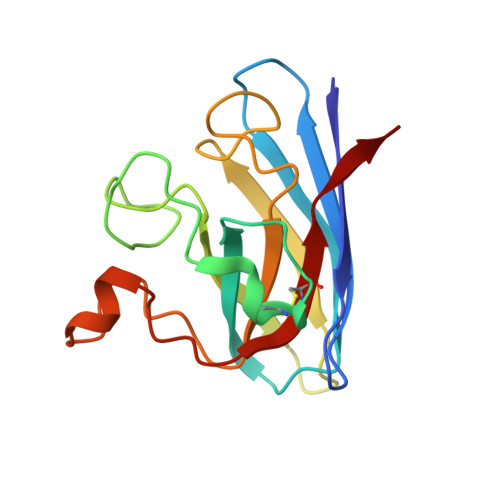The cysteine-reactive small molecule ebselen facilitates effective SOD1 maturation.
Capper, M.J., Wright, G.S.A., Barbieri, L., Luchinat, E., Mercatelli, E., McAlary, L., Yerbury, J.J., O'Neill, P.M., Antonyuk, S.V., Banci, L., Hasnain, S.S.(2018) Nat Commun 9: 1693-1693
- PubMed: 29703933
- DOI: https://doi.org/10.1038/s41467-018-04114-x
- Primary Citation of Related Structures:
5O3Y, 5O40 - PubMed Abstract:
Superoxide dismutase-1 (SOD1) mutants, including those with unaltered enzymatic activity, are known to cause amyotrophic lateral sclerosis (ALS). Several destabilizing factors contribute to pathogenicity including a reduced ability to complete the normal maturation process which comprises folding, metal cofactor acquisition, intra-subunit disulphide bond formation and dimerization. Immature SOD1 forms toxic oligomers and characteristic large insoluble aggregates within motor system cells. Here we report that the cysteine-reactive molecule ebselen efficiently confers the SOD1 intra-subunit disulphide and directs correct SOD1 folding, depopulating the globally unfolded precursor associated with aggregation and toxicity. Assisted formation of the unusual SOD1 cytosolic disulphide bond could have potential therapeutic applications. In less reducing environments, ebselen forms a selenylsulphide with Cys111 and restores the monomer-dimer equilibrium of A4V SOD1 to wild-type. Ebselen is therefore a potent bifunctional pharmacological chaperone for SOD1 that combines properties of the SOD1 chaperone hCCS and the recently licenced antioxidant drug, edaravone.
Organizational Affiliation:
Molecular Biophysics Group, Institute of Integrative Biology, Faculty of Health and Life Sciences, University of Liverpool, Liverpool, L69 7ZB, UK.

















